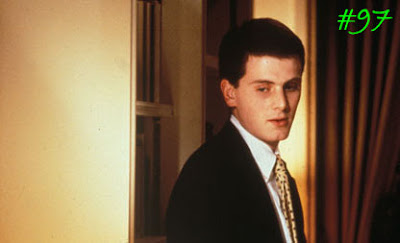
The first scene is one of startling tenderness and genuine emotion that sets the tone for the entire film. A young man and woman are face to face in the cold airy night exchanging soft delicate words. There is a moment where she asks him, “Why haven’t you ever kissed me before?” He responds plaintively, “I’m scared. Mostly because I don’t want it to be like when I kissed other girls.” She then responds with a gesture, suggesting that he kiss the palm of her hand and that way it wouldn’t be like the other girls. I’ve returned to this film on numerous occasions just to watch this opening scene unfold and each time it completely bowls me over in the way that Green is able to illustrate such transcending compassion between two people with such simplicity where their feelings for each other become fully realized. Of course, this scene wouldn't work without the fantastic performances of Zooey Deschanel and Paul Schneider who absolutely shine in their roles here. They each respectively give their characters nuance and idiosyncrasies; convincingly depicting them as flawed individuals who are vulnerable and desperately seeking for affection.
Few modern film romances released in the last couple years are as sincerely portrayed or tentatively impressionistic than the one found in David Gordon Green’s All the Real Girls. Eschewing the typical Hollywood-esque romance genre conventions, Green is intent on transposing the naive ideals and unreal expectations of love into something with tangential potency. The story itself is overly simplistic: Noel and Paul live in a small rural town in North Carolina full of broken-relationships where honest compassion is scarcely to be found. She is the kid sister of Paul’s best friend who has just returned home from boarding school and he is the local town’s Romeo. They decide to date for a while, break up on account of betrayal and painfully attempt to atone for their discretions (past and present) by getting back together. These are not spoilers of any kind because the actual plot remains secondary to Green’s examination of young love and the disappointments associated with vicariously relying on love to achieve enlightenment. The prospect of love being this all powerful instrument in curing one’s personal afflictions is a common misconception and Green is keen on reinforcing this notion through his young couple’s troublesome relationship.
With awe-inducing cinematography, Green successfully establishes a time and place where the environment plays a significant role in the different character’s behavior and attitudes. That isn’t to say that he is condescending towards these characters, portraying them as uneducated bumpkins. His film is distinctively southern and by capturing the ordinary details of every day life in this small southern community, Green is able to use the setting as a method in creating verisimilitude for his story. At times imperfect especially as the film comes to a close; All the Real Girls sustains a remarkable amount of poetic lyricism throughout and remains a powerful expression of genuine heartfelt intimacy between the lead characters which is all too rare in the majority of romances churned out of Hollywood these days.







